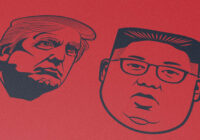Why are we so uncomfortable with the idea of improvising?
Business Insider’s Tara Francis Chan analyses the clues from the historic meeting between the leaders of the two Koreas: Kim Jong-un and Moon Jae-in. Chan noticed that the North Korean leader surprised observers by allowing himself to go off a carefully prepared script. Kim Jong-un has this in common with Donald Trump, which leads to this speculation about the forthcoming US-North Korea talks: “Having two leaders with a propensity for improvisation steer the US-North Korea summit could create a positive middle ground and help build a personal relationship between Kim and Trump. Or there could now be twice the chance of something being done or said in error, spelling disaster for bilateral negotiations.”
Here is today’s 3D definition:
Improvisation:
The basic skill of all great artists that allows them effortlessly to take something from their artistic tradition and remodel it in a context of collective creativity, a skill nobody believes should be applied to politics and many think should not even be tolerated in the arts
Contextual note
Today’s academic traditions in the arts put nearly all the emphasis on discipline, accuracy and quasi-religious respect for what has been formalized in written form. In contrast, all great artistic traditions have always not only allowed for but also encouraged improvisation on the part of their best practitioners.
Three parallel trends in the industrial West have combined to marginalize improvisation: academic insistence on conformity in both taste and technique; the rise of bureaucracy in our modes of governance; and the management culture that has ever more intently focused on efficiency and the elimination of risk.
In the traditional arts but also in public discourse, improvisation has been increasingly discouraged or repressed. The logic of standardization means that where freedom of expression had previously been encouraged, standardized expression became an obligation. Virtuosity — the mastery of technique — replaced the creativity of improvisation as the unique goal. Today, we have to be reminded that the archetypal “classical” musicians, Haydn, Mozart and Beethoven — those who pushed formal composition to its heights — opened their concertos to unwritten cadenzas, in which performers could become co-authors of the music they played and were invited to improvise, providing they could manage it.
In describing the personalities of Kim and Trump, the Business Insider article conveys the standard, modern “managerial” take on improvisation. Basically, “it ain’t good.” Chan does admit that there’s a small chance of success when leaders improvise. But rather than a possible breakthrough, she defines it as “a positive middle ground” (i.e. a safe zone). In contrast, she emphasizes the risk of an unscripted act on the part of Trump or Kim, where the risk would be real of “spelling disaster.”
Historical note
In most of the world’s musical traditions — including Europe’s — improvisation holds an important place as the key to constructive creativity. Think of Indian music and African-American jazz. But the dominant management culture that drives our economy and insists on standardized criteria for assessment has imposed a fundamentally negative connotation on the idea of improvisation. It means little more than deviation from the norm. And anything that swerves from the norm signifies increased risk, something that every well-schooled manager will be keen to avoid.
American presidents and world leaders of the past carefully avoided improvising, even when launching perilous and ill-advised wars. They worked on style, sought to sway, but memorized their scripts. They were clearly dedicated to playing their roles as guardians of the system that had brought them to power. They could propose reform — and indeed were expected to — but they understood that they couldn’t improvise.
 History now seems to be moving in a different direction. The mavericks have advanced to front stage: Donald Trump, Rodrigo Duterte, Kim Jong-un, Emmanuel Macron, Mohammed bin Salman and Narendra Modi — to name those who are most in view. They are the reality show style exemplars of the trend, each in a different way.
History now seems to be moving in a different direction. The mavericks have advanced to front stage: Donald Trump, Rodrigo Duterte, Kim Jong-un, Emmanuel Macron, Mohammed bin Salman and Narendra Modi — to name those who are most in view. They are the reality show style exemplars of the trend, each in a different way.
But this isn’t the constructive improvisation of great artists, who know and respect the context of their art and develop their voice to enrich the language of their tradition. What we’re seeing in politics today is the opposite of artistry. It is showmanship, even brinksmanship, the improvisation of demagogic narcissists. When Macron tells Chris Wallace that what he likes about being president is “deciding” or being free to impose his will, this is not improvisation, but supreme egoism, his living out a personal fantasy.
Improvisation is too precious a human activity for us to let it be stifled under the weight of standardization. But what a shame that as the rest of us carefully manage our lives and meager resources, only the showmen and egoists allow themselves to improvise. And do it so ineptly.
*[In the age of Oscar Wilde and Mark Twain, another American wit, the journalist Ambrose Bierce, produced a series of satirical definitions of commonly used terms, throwing light on their hidden meanings in real discourse. Bierce eventually collected and published them as a book, The Devil’s Dictionary, in 1911. We have shamelessly appropriated his title in the interest of continuing his wholesome pedagogical effort to enlighten generations of readers of the news.]
The views expressed in this article are the author’s own and do not necessarily reflect Fair Observer’s editorial policy.
Photo Credit: pantid123 / Shutterstock.com
Support Fair Observer
We rely on your support for our independence, diversity and quality.
For more than 10 years, Fair Observer has been free, fair and independent. No billionaire owns us, no advertisers control us. We are a reader-supported nonprofit. Unlike many other publications, we keep our content free for readers regardless of where they live or whether they can afford to pay. We have no paywalls and no ads.
In the post-truth era of fake news, echo chambers and filter bubbles, we publish a plurality of perspectives from around the world. Anyone can publish with us, but everyone goes through a rigorous editorial process. So, you get fact-checked, well-reasoned content instead of noise.
We publish 2,500+ voices from 90+ countries. We also conduct education and training programs
on subjects ranging from digital media and journalism to writing and critical thinking. This
doesn’t come cheap. Servers, editors, trainers and web developers cost
money.
Please consider supporting us on a regular basis as a recurring donor or a
sustaining member.
Will you support FO’s journalism?
We rely on your support for our independence, diversity and quality.






